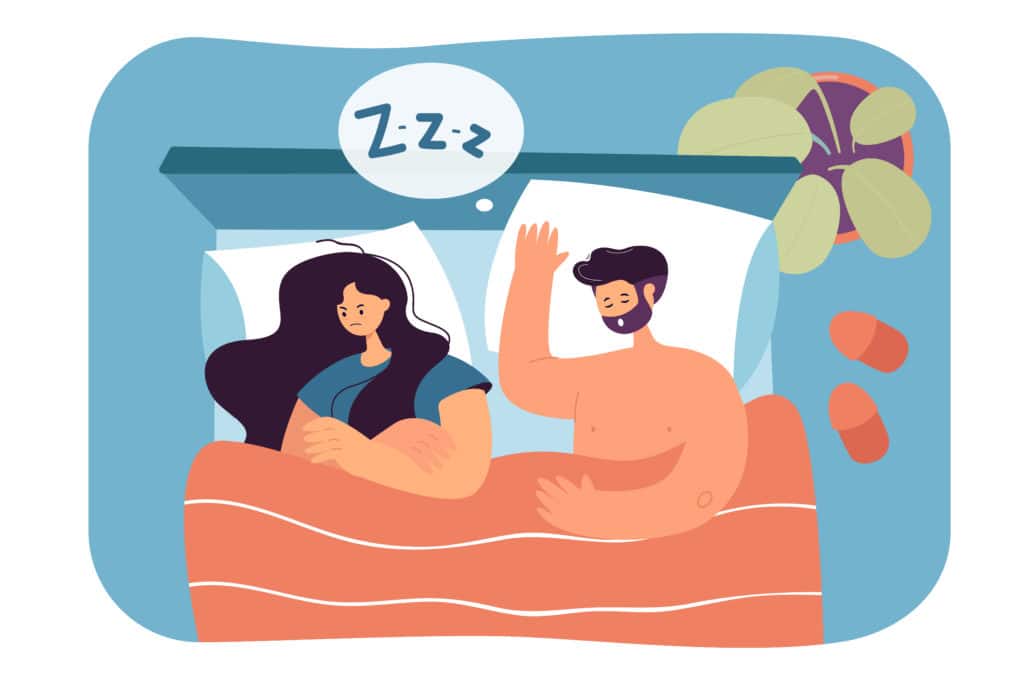
THE BOTTOM LINE:
- Sharing a bed with someone can create many challenges.
- There are solutions you can use to make these challenges easier
- Sometimes sleeping in separate rooms is the best option, and that’s ok!
Table of Contents
Sharing isn’t always easy, especially when it comes to your bed. Even if you’re head over heels in love– partners can also sometimes be pretty disruptive to your slumber. Luckily, there are strategies you can use to manage your partner’s sleeping habits to ensure that you (and your relationship) are reaping all the benefits of sleeping with a partner. Let’s take a look at some of the most common concerns that couples share and how to address them!
MY PARTNER SNORES LIKE A FREIGHT TRAIN
People who sleep with snorers get woken up a lot during the night (even without realizing it) and are more likely to report feeling daytime fatigue. Unsurprisingly, research has found that sleeping with someone who snores may cause fragmented sleep and decreased sleep quality. If your partner doesn’t believe you about their snoring, try downloading the SnoreLab app for some definitive proof (and a snore score).
Solutions to help your partner stop snoring:
Bedtime remedies: Get your partner some bedtime remedies such as nasal strips, oral devices, or anti-snore pillows. You can also suggest that your partner prop themselves up with a few pillows to reduce gravity’s effects on their airways.
Nasal fix: A dry or irritated nasal passage is a common cause of snoring. Keep your bedroom air moist with a humidifier to reduce snoring. Also, have remedies on hand to treat nasal issues, such as a neti pot, saline solution, or antihistamines. A quick saline wash every night is incredibly effective for many people with snoring caused by minor allergies.
Anti-snoring throat exercises: Believe it or not, you can reduce snoring through these anti-snoring throat exercises. Anti-snoring exercises have been found to reduce the frequency and intensity of snoring by 60%! You could even do some of these throat exercises with your partner before bed.
Get checked: Snoring can be a serious health issue like sleep apnea. Get your partner to take this quiz to see if their snoring may be due to sleep apnea and consult your doctor. Getting evaluated for sleep disorders is an important first step that can even improve their lifespan.
Quit smoking: Being around smoke or smoking can cause irritation that leads to snoring. Yet another reason to quit, amirite?
Health check: Obesity can make snoring worse due to the extra tissue surrounding the airways. If this is a concern for your partner, try getting some extra activity together and revamping eating habits to swap in healthier whole foods.
Solutions to get your through the night when your partner snores:
Earplugs: It’s a simple fix but they can block out a great deal of noise. Foam ones tend to be the most comfortable for the majority of people.
Sound machine: Sound machines come preloaded with nature sounds, white noise, and other ambient sounds. Not only do they drown out the noise, but they can also help you fall asleep faster and improve the quality of your sleep.
Sleep in another room: As a last case scenario, you (or your partner) may need to move to another room in order to get the quality of sleep you need. You can still have some intimate time and a cuddle before retiring to your separate rooms.
MY PARTNER IS A RESTLESS SLEEPER
If your partner has restless leg syndrome or tosses and turns all night, it could be not only disruptive to your sleep quality but probably pretty painful as well.
Solutions:
Upgrade mattress size: If your mattress isn’t large enough you can’t get enough spade away from your partner. To ensure you each have an adequate amount of room to sleep, upgrade your mattress size. Fun fact! Sharing a double mattress with another person gives you each the amount of room equivalent to sleeping in a crib! Wowza!
Upgrade to a new mattress: Your mattress may not be ideal for movements. Newer mattresses are now able to absorb movements to the point that you can sleep through the night without feeling your partner move! A foam mattress that’s slightly firmer is a great choice to prevent the disruptive bed movements that occur when your partner tosses and turns.
Separate blankets: If you’re sleeping with a bed hog it may be time to separate your blanket situation. Have your own top sheets and comforter so that they can’t steal from you anymore.
Give them magnesium: Taking 400 mg of magnesium daily (or before bed) can help reduce restlessness for many people.
Get checked: If you or your partner has restless leg syndrome that’s interrupting your sleep, make sure to see a doctor. There are plenty of effective pharmaceutical treatments available that can help.
MY PARTNER LIKES IT HOTTER THAN ME
Research has found that sleeping in a warmer bedroom can cause disrupted sleep, so what do you do if your partner prefers to sleep in the heat?
Solutions:
Blanket distribution: Double fold your blanket so there are more layers on one side or add an additional blanket to the heat-seekers side. They can also try a hot water bottle at their feet or pre-warming their section with a quick pass using a hairdryer.
Dress for warmth: Encourage your partner to wear warmer PJs like flannel or even fleece.
Invest in an electric blanket: They come in dual-control to customize each side of the bed to your preferred temperature, or you can get a twin-sized blanket to use on your partner’s side.
MY PARTNER GETS HOT DURING THE NIGHT
If you are sleeping with a human furnace it can cause you to wake up covered in your own sweat (or theirs). Don’t worry, there are solutions to keep you both cool.
Solutions:
Cooling fibres: Invest in sheets that regulate temperatures like cotton, bamboo, or hemp fibres. You can also find specialty sheets that use sweat-wicking fibre blends from companies such as Perfect Linens.
Sweat-proof mattress: People with a lot of body heat often find that memory foam mattresses make the problem worse. Fortunately, there are now many mattresses specifically designed for releasing heat while you sleep with air holes and materials like charcoal and gel that pull away warmth.
Cooler room: Turning the temperature down in your room even cooler may be a quick fix. You can also try putting a fan on their side.
Ice pack: Overheating in the middle of the night is no fun for anyone. Your partner can readjust by grabbing an ice pack from the freezer and placing it near their feet to cool down without disrupting you.
MY PARTNER LIKES ELECTRONICS BEFORE BED
If your partner plays video games or watches TV in bed, it is definitely going to disrupt your sleep. Many people claim they “need the TV to fall asleep” but ultimately, TV reduces sleep quality. Additionally, exposure to light from devices before bed suppresses melatonin.
Solutions:
Keep electronics out of the bedroom: Use your bedroom only for sleep and sex. This will ensure you both get a better night’s sleep.
Swap it: If they like to fall asleep to the sound of a TV you can swap it out for a sound machine. Sound machines have a variety of sleep-conducive noises and they don’t emit light. Unlike TVs, sound machines actually help you sleep better.
MY PARTNER HITS SNOOZE 17,000 TIMES EVERY MORNING
There’s nothing worse than that repeated BEEP BEEP BEEP BEEP of a typical alarm clock. It’s especially annoying when you don’t have to wake up early. Telling your partner to “stop hitting snooze” may not be working, luckily, there are other solutions.
Solutions:
Upgraded alarms: Nowadays you can get really handy alarm clocks, such as ones that vibrate your side of the bed or turn a light on. You can even get vibrating alarms that you wear on your wrist (many trackers and smartwatches even have smart alarms). The point is that there are tons of options when it comes to alarms. There’s no longer any need to suffer, your partner can find an alarm that wakes them up without waking up the whole house.
Relocate: An easy solution for someone who hits snooze a lot is to move the alarm clock away from the bed. The trick works because they have to get up to turn it off. This solution doesn’t exactly offer you undisturbed sleep but it helps in scenarios where you may also want to take up around the same time.
A GUIDE TO DEALING WITH
DIFFERENT SLEEP SCHEDULES
Your partner may be a night owl while you enjoy an early bedtime. Their work schedule might cause them to not even be at home when you’re sleeping. Whether it’s due to work, kids, travel, or insomnia, you may find yourself wondering how you’re supposed to reap the benefits of sleeping with your partner if they aren’t sleeping at the same time as you? Luckily these tips can help you and your partner stay connected even when your sleep schedules are disconnected:
IF YOU HAVE VASTLY DIFFERENT BEDTIMES
Try spending some time together in bed – to cuddle or have sex – prior to the earlier partner’s bedtime. Once said partner is sleeping, the other is free to leave and come back later when they’re ready for sleep. This is a great option for intimacy and by leaving and returning to sleep later, there will be no unhelpful associations created with bedtime (remember, you should only use your bed for sleep and sex).
IF YOUR BEDTIMES ARE AN HOUR APART
You could suggest that your partner (or you if you’re the later sleeper) try reading a book or doing a crossword in bed after cuddles or sex. Make sure to use a personal book lamp to not have bright light impede on your (or your partner’s) sleep.
IF ONE OF YOU IS AN EARLY RISER
Consider installing motion-sensor night lights that will make it possible to get up and ready in the mornings without disrupting your partner’s slumber.
IF ONE PARTNER IS AT WORK WHILE THE OTHER SLEEPS
It is extremely important to take the time to connect with your partner outside of work/sleep hours. That could mean a weekly brunch date, going for a walk together, or video chatting during a time in your schedule where “free time” overlaps. Also, set clear noise boundaries in the house so that both partners can get adequate sleep.
Other solutions:
You can also try shifting your (or your partner’s) sleep schedule by using light therapy to sync up and maximize the amount of time you spend in bed together:
If you want an earlier bedtime: Bright light exposure first thing in the morning can help to move a sleep schedule earlier.
If you want a later bedtime: Bright light exposure in the late afternoon or evening will move a sleep schedule later.
ROOM UPGRADES TO CONSIDER
1. PACK YOUR NIGHTSTAND
Always have eye masks and earplugs ready so you can deal with sleep disturbances.
2. INVEST IN A SOUND MACHINE
Sound machines can provide calming feelings before bed using nature sounds such as waves, rain, or birds chirping. These sounds are called “pink noise” and have been found to improve brain synchronicity which means you sleep more soundly.
3. BUILD YOURSELF A FULL SLEEP SANCTUARY
Learn how to build yourself a sleep sanctuary and the benefits it will provide for your sleep with our comprehensive guide.
Be Realistic
Your partner may be a night owl while you enjoy an early bedtime. Their work schedule might cause them to not even be at home when you’re sleeping. Whether it’s due to work, kids, travel, or insomnia, you may find yourself wondering how you’re supposed to reap the benefits of sleeping with your partner if they aren’t sleeping at the same time as you? Luckily these tips can help you and your partner stay connected even when your sleep schedules are disconnected:
Advantages to sleeping separately:
Some couples are totally ok with the fact that they don’t sleep at the same times as their partners. In fact, some even suggest that it’s better because it’s their only way to enjoy some “alone time”, and they can completely avoid sleep disturbances caused by a partner who snores, is restless, or makes frequent bathroom trips. You can always have a little cuddle or intimacy session before heading off to your respective rooms.






